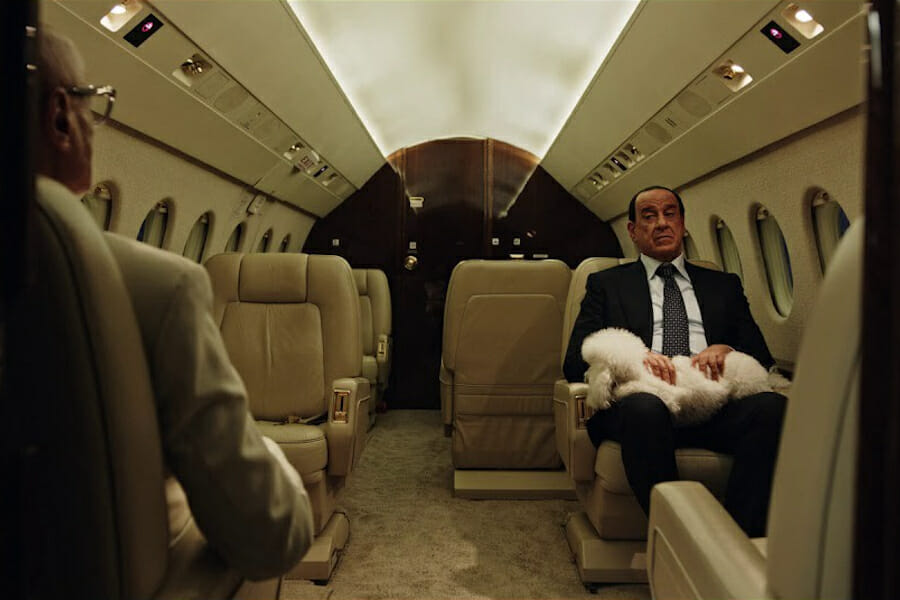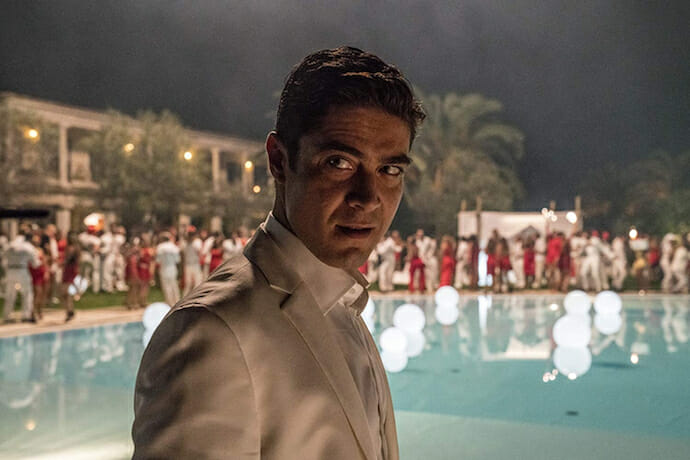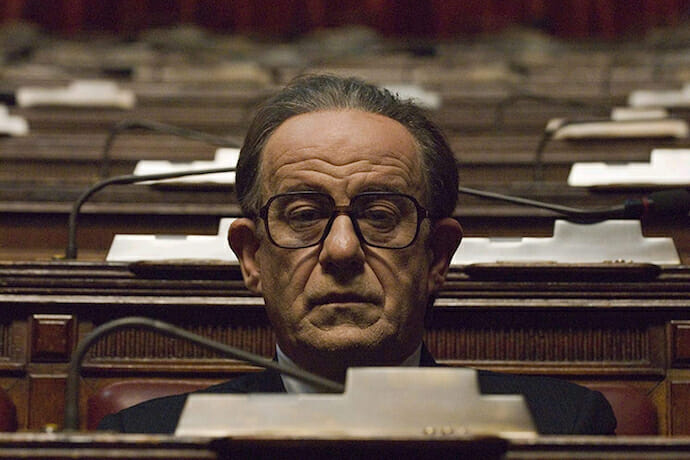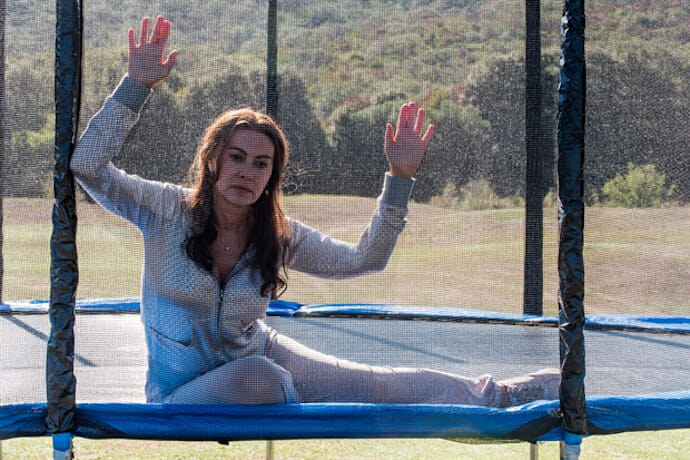
A Movie about Berlusconi, Through the Eyes of a Young Italian
When my parents first met, in 1992, politics was very difficult topic to avoid, especially in Milan. The city had become the epicenter of the biggest political scandal of the century when the unearthing of a minor investigation had led to discovering an immense network of favors and gifts compromising most of the country’s political and economic leadership. You would’ve been hard pressed to find someone whose employer hadn’t been summoned to court. My parents worked for a gargantuan industrial conglomerate, and unsurprisingly their cubicles were regularly raided by the financial police. I grew up hearing the stories of old socialist politicians trying to hide the grease money in the bookshop where I bought most of my childhood’s books, of how the collapse of the old order had happened almost overnight.
For my generation, there’s something inherently mythological to those years: it was as if every contradiction on which the republic had been founded, from corruption to the mafia, from political clientelism to a deeply flawed economic system, all had resurfaced in a single year. It also makes for great TV: Italy has recently experienced a surge of fiction set during the early 90s and usually focusing either the terror campaign of the Sicilian mafia (La mafia uccide solo d’estate, Il cacciatore) or the twilight of the old political elite (1992, Il gioiellino).
However, if you were to judge by the settings of Italian series and movies, the country’s political scene stopped being interesting after 1994. That is the year in which Silvio Berlusconi first became prime minister, a short six months tenure that ultimately collapsed because of the government’s attempts to pass laws benefiting the entrepreneur’s companies. He wouldn’t be re-elected until 2001, but his mere presence on the political spectrum had already brought radical changes to Italy’s public life. The great play that has been Berlusconi’s career has always run parallel to the lives of the generation born and raised during his times. My own prehistory, the first time my parents met, coincided with the clean slate on which “il cavaliere” was able to build his tenure. His exploits accompanied our formative years, his scandals dominated the cultural scene. He was an omnipresent figure in anything political, far beyond his role as leader of the biggest center-right party.
The total control he had on his image meant that Italian politics could only be defined through his prism: you were either his backer or his opposer, and he was always able to seize the initiative with campaigns that scandalized his adversaries and tantalized his voters. Most importantly, he was a performer: whether he insulted prominent German politicians, made misogynist jokes or was persecuted for tax evasion or mafia, he was always able to embody different roles for different audiences. He morphed into different characters over my youth. When I was 10, in my family he represented the apotheosis of corruption, the criminal who had evaded capture and protected his loot by abusing the constitution. Around his last presidency, in the middle of my teen years, he had become a decadent king dragging the country into an economic abyss, captivated by an orgy of sex and power. To tell a story about Berlusconi isn’t hard just because of the intimate and yet heterogeneous knowledge the public has of his life, but also because during his 20 years in power he changed his mask so many times that trying to frame him through a single aspect of his career would not fully capture the cultural fallout he provoked.

Because of these factors, I believe that only Paolo Sorrentino could’ve been able to write and direct a movie about such a complex figure. To a certain degree, his entire filmography is dedicated to streamline existential struggles: whether he’s exposing the existential dread of Roman jet-set (The Great Beauty), or the psychological unraveling of a mafia front man (The Consequences of Love), he tends to strip away narrative contraptions and a clear sense of storylines, reducing the structure to a bare minimum. Unexpectedly, this often leaves a sense of pretentiousness or unease: the first scene of Loro is a grand example of this, as during the first few minutes the audience witnesses the death by heatstroke of a goat who entered Berlusconi’s villa in Sardinia, a lavish estate in which he spends much of the story. At its core, this is nothing more than an event setting the mood for the first part of the movie, which follows the attempts by an ambitious pimp to outsmart his colleagues higher in the food chain. Moreover, Sorrentino’s passion for parties and intrigue are an especially strong asset. He can seemingly merge well-choreographed social blow-outs and to transmit the rush of enthusiasm and vitality they provoke, while also employing a merciless camera capturing the deep squalor of the characters populating them. The protagonists of his movies always seem to be escaping from an unavoidable power-that-be casting a long shadow on their lives, be it the mafia or a state-run conspiracy. By highlighting the grotesque, he creates a cast of characters echoing Pirandello’s understanding of humor as putting the absurdity of human condition om display. However, it was clear that he couldn’t just apply his signature formulas to a character with such an embattled public image. Empathy for the characters’ painful existence is mitigated by the objective damage they caused to Italian public life.
Moreover, there’s the issue of Berlusconi’s heavy personal legacy. Not only was he the everyday bread of newspapers for decades, but the total control over his public image means that getting acquainted with his persona(s) may be the total opposite from knowing anything about him. This may be a familiar feeling for those masochists interested in Italian politics: their opacity is ever-more confusing because its multifaceted. On a basic level, there are the kind of secrets on which it’s easy to build a narrative: the mysteries of false-flag attacks, secret encounters, assassinations are the kinds about which Andreotti bursts out in the climax of Il Divo, in a masterful interpretation of Toni Servillo: “They have no idea about what kind of misdeeds power must perpetrate to ensure the country’s welfare and development. For too many years, the power has been me. The monstrous, unspeakable contradiction: to do harm to guarantee right.”

But if Servillo could interpet a Shakesperian villain, as Berlusconi he plays a salesman whose secrets are so banal and public that informed citizens can’t possibly hope on any great revelation. To have a full picture, they needed to engage in a true tour de force, to stay updated on the latest scandal, on a network of partygoers, of ski instructors (previous employment of a former foreign minister), of stable boys that turn out to be employed by the mafia. In Loro, Servillo interprets a man who shares little with Richard III and sees in simplicity and vitality his cardinal virtue: “The left fails to figure me out, it thinks that everything is so complicated. And yet, everything is so elementary.”
To “understand” Berlusconi, we thus need to peel off the layers of characters he has worn over the course of the years. The audience is first lead through the undergrowth of politics living on his back in the first movie, leaving his political manipulations behind and going ever so back to his early days as a TV entrepreneur. The prism through which we witness this deconstruction is the separation with his second wife, a character who desperately tried to escape her past as cabaret dancer and too, albeit clumsily, wears masks over masks. However, while she’s still able to remove them at the height of their arguments, the tragedy of Berlusconi is that he has become those masks. In one scene, when a young girl refuses his sexual advances during a party, he finds himself unable to respond to her melancholic recriminations: “Cosa c’é dopo? What remains afterwards?”
***
Loro is maybe the only movie in recent memory which approaches the heart of politics by touching only briefly upon the political game: where many other try to find the essence of power in the political scheming, in the lust of power, Sorrentino paints the picture of a man who has burned the bridges behind him and can only live the moment. Although sometimes problematic, splitting the story in two movies is especially useful to craft the mirages of seductive women that populate the story: Loro 2 is full of imagery which is not only pornographic in its content, but also structure: girls appear out of thin air and exist only to please.
However, the audience had been made well aware of the logistics in the previous installment — leaving the kind of sordid aftertaste that Berlusconi himself perceives in moments of lucidity. Additionally, the movie makes little to no attempt to cross over to a documentary style: characters are altered and renamed, few existing individuals are explicitly mentioned, and even the timeline of the events deviates slightly from real life, with some scandals anteceding his last rise to power. Politics are seen more as an antidote to the dullness of his lavish life, little more than organizing another party.

People who go in searching for a summary of those years will be disappointed, but it’s an abstraction that leaves more meaning than any verbalization of reality. This applies to the finale, too; we don’t get to see when the prime minister was ousted for his inability to contain the crisis that hit Italy in 2011, on the contrary, the movie leaves him at the beginning of his last term in office. However, just a year after the election, the government had to deal with the aftermath of the violent earthquake in L’Aquila, which killed 300 and left 80,000 without a home. The sense of powerlessness and the brutal return of reality of 2008 were similar to the final days of Berlusconi’s government, when the bad deeds of the last two decades (but also of his predecessors) came back with a vengeance, crippling Italy’s economy to this day. Even for my family there was no cheering when he left the presidential palace: he now played the role of the one who had brought the country to the brink of disaster. It wasn’t the last time we got to hear from him: in the following seven years, he was still able to play the kingmaker thanks to a highly fragmentized parliamentary system. This year’s elections however have left his party with less than half of the seats it had at its peak, overshadowed by its former junior partner, the League, and excluded from the government that came to be after months of negotiations. Today, if I see him on TV, the first thing that comes to mind is neither the number of criminal proceedings open against him, nor the arrogance or the decadence of his years in office; I just see an old man who truly believes to be the masks he’s wearing.

